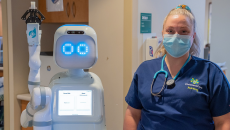Mike Miliard
The "collaborative robots," known as Moxi, will be linked with the Delaware health system's Cerner EHR. They're designed to make deliveries and collections, helping ease clinicians' workload and enabling them to focus on care.
The migration, which transferred more than 3 million accounts in just hours, is projected to save the health system as much as $5 million annually.
Their new peer network of major health systems is designed to boost health outcomes for marginalized patient populations, helping hospitals "apply an equity lens to all aspects of quality and safety."
The virtual care expansion, which builds on Amwell's SilverCloud Health acquisition, is designed in response to clinician shortages and aims to help reduce the cost of mental healthcare, the company says.
With real-world data from its Learning Health Network, Cerner hopes to advance oncology innovation and expand access to clinical trials.
ONC's coordinating entity for TEFCA is seeking feedback on the draft, which details proposed processes and requirements for becoming a Qualified Health Information Network.
The new program is "designed exclusively for clinical and operational executives who lead their organizations' approach to investing in AI as a strategic initiative."
In collaboration with Columbia and Vanderbilt, the medical informatics group seeks to optimize EHR charting and reduce burden on U.S. clinicians by 75% by 2025.
The two-year collaboration will focus efforts to extend comprehensive standards for interoperability and specs such as FHIR across the the healthcare community.
It's working with KLOC HEALTH to develop the mobile, on-demand scheduling tool to help it predict staffing options more accurately and flexibly.









